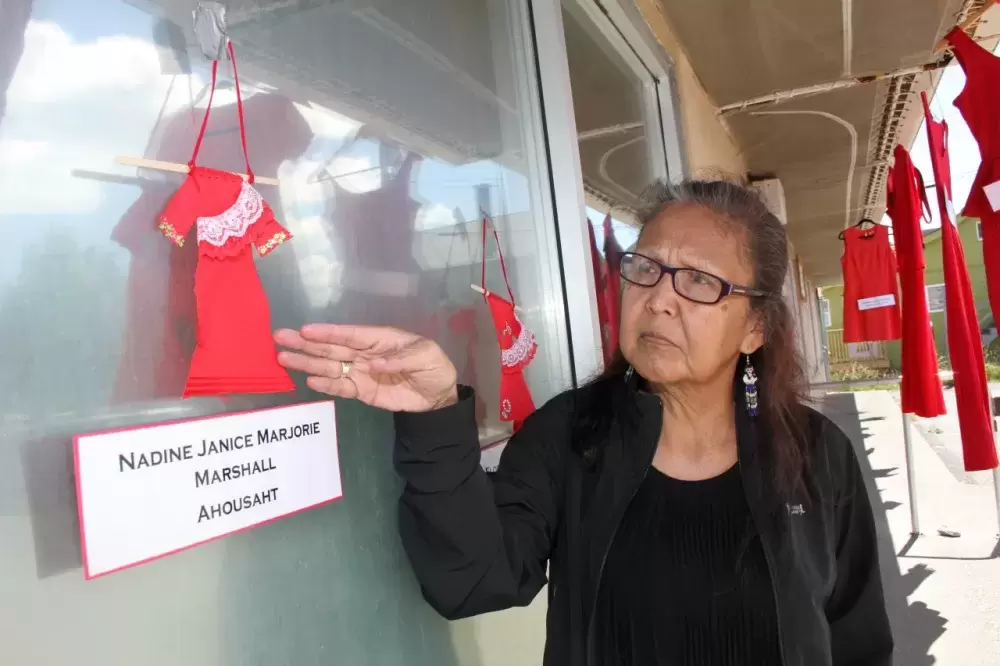With today’s completion of the final report from the National Inquiry into Missing and Murdered Indigenous Women and Girls, Nuu-chah-nulth families affected by the issue are looking for changes from a justice system that left them with nothing but unanswered questions.
After more than two years, $53.8 million in allocated funds and testimony from 2,380 people across the country, the inquiry sent a 1,200-page final report to the federal government. The work began in 2016 to find answers around the prevalence of Indigenous women and girls who fell victim to homicide or went missing. The national inquiry cites a homicide rate against Indigenous women that is four times the Canadian average.
The submission to Ottawa includes 231 “calls for justice” to implement “an absolute paradigm shift in Canadian society,” said the inquiry’s Chief Commissioner Marion Buller.
“This is not what Canada is supposed to be about, it is not what it purports to stand for,” she emphasized.
The inquiry’s calls include social programs to improve the lives of Canada’s Indigenous peoples, tougher penalties for men who commit abuses on their partners, as well as more aboriginal judges, justices of the peace and police officers – or the establishment of a separate court system that delivers more “meaningful and culturally appropriate justice practices.”
Joanne Malinski is intensely familiar with how it feels to be disregarded by the justice system. She went through her teenage years haunted by uncertainty over the murder of her mother when Malinski was 12. Ditidaht member Patricia Thomas was found Dec. 15, 1984 in a Vancouver barbershop with a blood-alcohol level of .51. Her death was linked to Gilbert Paul Jordan, also known as the “Boozing Barber”, a serial killer known for murdering women through the administration of lethal levels of alcohol. Despite evidence connecting him to the deaths of at least eight women, Jordan was only convicted for one: 15 years for manslaughter that was reduced to nine on an appeal. He ended up serving six years before being released.
The same year that the national inquiry was launched, Malinski attended a gathering in Prince George for Indigenous families who lost loved ones to murder. As a teenager she was angry at her mother for leaving the family, by Malinski said that at the event in Prince George it helped to hear others call out her mother’s name.
“To realize that you’re not by yourself, that you’re not the only family out there…that opened my eyes,” said Malinski, who thinks about her mother every day. “I don’t have very many memories of her, other than she was, from what I can remember, very caring, very loving.”
Stan Matthew lost his sister, Mary, when he was 16. She was found on Vancouver’s East Hastings in 1978, but little information was provided to the family by police at the time, other than that an investigation was ongoing.
“It has never been solved,” he said. “There was really no follow-up with my family after the investigation, it was just left.”
After the event in Prince George, the Nuu-chah-nulth Tribal Council hosted a gathering for families affected by the issue in September 2017. Although this wasn’t one of the national inquiry’s official hearings, legal representatives from the federal initiative came to Port Alberni to hear statements from participants. Matthew is glad that his family was able to contribute to a movement that has put the issue “more out in the open.”
Rowena Cootes also provided a statement – but she said recounting the loss of her sister Nadine Marshall on Aug. 3, 2012 was “very difficult, very emotional”. After Marshall was found behind a dumpster in Victoria’s Equimalt area with strangle marks on her neck, no charges were made by police.
“Back then my concern was that they didn’t investigate her death properly and it led to unanswered questions,” she said. “My father, until the day he died, was down at the police station inquiring about if they found anything new.”
Qajaq Robinson, one of the inquiry’s commissioners, said how such violence has been managed is a concern for the entire country.
“Ending this genocide and rebuilding Canada into a decolonized nation requires a new relationship and an equal partnership between all Canadians and Indigenous Peoples,” she said.
The national inquiry has its share of difficulties, including the resignation of two executive directors and a commissioner, Marilyn Poitras, who cited problems with the structure the initiative. But now those working closely with the families of Nuu-chah-nulth victims are hopeful that the women and girls who were lost will no longer be disregarded.
“We had to put our information forward, but it was with a lot of broken hearts,” said Lisa Watts, who specializes in supporting the loved ones of missing and murdered victims at Teechktl Mental Health. “It’s so important that all kuu’uus women are valued.”
To promote healing, Teechuktl Mental Health will be hosting a gathering for the loved ones of victims at the Italian Hall in Port Alberni (4065 6th Avenue) this Wednesday and Thursday, from 9 - 4:30.







